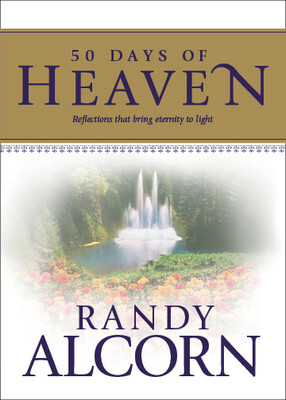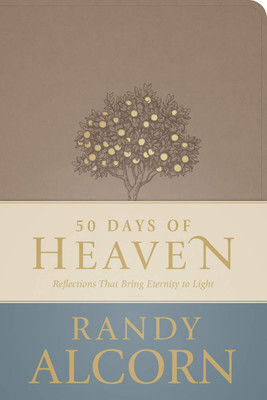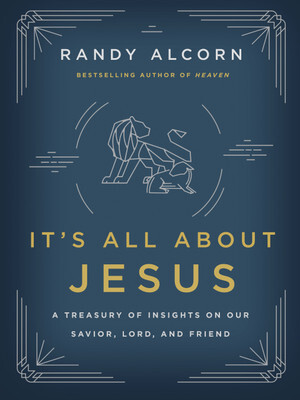Randy Alcorn's Blog, page 9
May 19, 2025
The Kingdom of Kingdoms

God created Adam and Eve to be king and queen over the earth. Their job was to rule the earth to the glory of God.
They failed.
Jesus Christ is the second and last Adam, and the church is His bride, the second Eve. Christ is King, the church is His queen. He will exercise dominion over all nations of the earth: “He will rule from sea to sea and from the River to the ends of the earth. . . . All kings will bow down to him and all nations will serve him” (Psalm 72:8, 11). As the new head of the human race, Christ will at last accomplish what was entrusted to Adam and Eve—with His beloved people as His bride and co-rulers. God’s saints will fulfill on the New Earth the role that God first assigned to Adam and Eve on the old Earth. “They will reign for ever and ever” (Revelation 22:5).
Human kingdoms will rise and fall until Christ brings to Earth a Kingdom where mankind will rule in righteousness. Daniel prophesied, “In the time of those kings, the God of heaven will set up a kingdom that will never be destroyed, nor will it be left to another people. It will crush all those kingdoms and bring them to an end, but it will itself endure forever” (Daniel 2:44).
As Christ will be the King of kings, His realm will be the Kingdom of kingdoms—the greatest kingdom in human history. Yes, human history, for our history will not end at Christ’s return or upon our relocation to the New Earth; it will continue forever, to the glory of God.
“Rejoice greatly. . . . See, your king comes to you, righteous and having salvation, gentle and riding on a donkey, on a colt, the foal of a donkey. . . . He will proclaim peace to the nations. His rule will extend from sea to sea and from the River to the ends of the earth” (Zechariah 9:9-10). Matthew 21:5 makes it clear that Zechariah’s prophecy concerns the Messiah. Just as the first part of the prophecy was literally fulfilled when Jesus rode a donkey into Jerusalem, we should expect that the second part will be literally fulfilled when Jesus brings peace to the nations and rules them all. Jesus will return to Earth as “King of kings and Lord of lords” (Revelation 19:11-16). We’re promised that “the Lord will be king over the whole earth” (Zechariah 14:9).
Bible-believing Jews in the first century were not foolish to think that the Messiah would be King of the earth. They were wrong about the Messiah’s identity when they rejected Christ, and they were wrong to overlook His need to come as a suffering servant to redeem the world; but they were right to believe that the Messiah would forever rule the earth. He will!
In His parables, Jesus speaks of our ruling over cities (Luke 19:17). Paul addresses the subject of Christians ruling as if it were Theology 101: “Do you not know that the saints will judge [or rule] the world? . . . Do you not know that we will judge [or rule] angels?” (1 Corinthians 6:2-3). The form of the verb in these questions implies that we won’t simply judge them a single time but will continually rule them.
If Paul speaks of this future reality as if it were something every child should know, why is it so foreign to Christians today? Elsewhere he says, “If we endure, we will also reign with him” (2 Timothy 2:12). God’s decree that “[his servants] will reign for ever and ever” on the New Earth (Revelation 22:5) is a direct fulfillment of the commission He gave to Adam and Eve: “Be fruitful and increase in number; fill the earth and subdue it. Rule over the fish of the sea and the birds of the air and over every living creature that moves on the ground” (Genesis 1:28).
David confirmed for all humanity the original great commission that God gave to Adam and Eve: “You gave them charge of everything you made, putting all things under their authority” (Psalm 8:6, NLT).
Mankind’s reign on the earth is introduced in the first chapters of the Bible, mentioned throughout the Old Testament, discussed by Jesus in the Gospels and by Paul in the Epistles, and repeated by John in Revelation. From start to finish, we are told that our God-given purpose and destiny are to rule the earth.
God’s desire is to prepare you now for what you will do forever. As any athlete, soldier, or farmer will tell you, preparation isn’t always easy. But it’s necessary, and its payoffs are huge. Our role as Kingdom rulers is not automatic—God makes it dependent on our faithful service here and now.
Are you ready to rule the New Earth? No? That’s all right. God’s plan is to shape your life to make you ready . Are you cooperating with His plan, submitting to His training, and learning to call upon His strength and wisdom?
Thank you, Lord, that as your image bearers, we are still capable of bringing you glory, even in a world that is so bent. Thank you that your purpose and calling for us have not changed. Thank you that you are preparing a world for us to rule—and you are preparing us to rule it, for your eternal glory. Help us, Lord, never to think we do not have a role in your plan for our lives. Help us to fulfill our responsibilities and exercise the spiritual disciplines of meditation, prayer, fasting, giving, and serving others, so that we might be the sorts of children and servants that you take pleasure in commending and rewarding.
Excerpted from 50 Days of Heaven.
Recommended Reading
 50 Days of Heaven
50 Days of Heaven  50 Days of Heaven (Special Edition)
50 Days of Heaven (Special Edition)  Everything You Always Wanted to Know About Heaven
Everything You Always Wanted to Know About Heaven
May 16, 2025
How Are Faith and Works Related When It Comes to Salvation?

Note from Randy: Earlier this year, I shared Kevin DeYoung’s article Faith and Works: Does James Contradict Paul? on my blog. A reader wrote us with this question in response:
I read the article you posted on Randy’s blog from Kevin DeYoung. However, the equation he shared of F(aith)=J(ustification)+W(orks) still does not ring true with me. I have pondered it, repeated it to myself and still do not come up with anything different from Faith+Works=Justification. I am sure a lot of it has to do with DeYoung being brighter than I am. Yet this equation still is troublesome. If someone would like to use other words to convince me of the correctness of the equation, I am all ears.
My thanks to Stephanie Anderson, EPM staff, for her excellent response.
I wonder if your questions come up because Scripture (including the book of James) does very much emphasize the importance of our works, and eternal rewards has tended to be a neglected area of doctrine in evangelicalism. You may be familiar with what Randy has written about eternal rewards and how God will reward His children for their works done in this life (see Can We Really Earn Eternal Rewards?).
In that article, Randy explains:
Let’s be sure this is perfectly clear: Salvation and rewards are different.
Salvation is about God’s work for us. It’s a free gift, to which we can contribute absolutely nothing (Ephesians 2:8-9; Titus 3:5).
Rewards are about our work for God.
Salvation is dependent on God’s faithfulness to his promises, and on his mercy.
Rewards are conditional, dependent on our faithfulness (2 Timothy 2:12; Revelation 2:26-28; 3:21).
Belief determines our eternal destination...where we’ll be
Behavior determines our eternal rewards...what we’ll have.
Works do not affect our redemption. Works do affect our reward. Just as there are eternal consequences to our faith, so there are eternal consequences to our works.
Because we speak of rewards so rarely, when we do speak of them it’s easy to confuse God’s work and man’s. We may, for example, mistakenly believe that Heaven is a person’s reward for doing good things. This is absolutely not the case. Eternal life is entirely “the gift of God” (Romans 6:23). In going to heaven we don’t get what we deserve. What we all deserve is hell. Heaven is a gift, not a reward.
In regard to salvation, our work for God is no substitute for God’s work for us. In regard to rewards, God’s work for us is no substitute for our work for God. Of course, this doesn’t mean we work in our own strength to earn rewards. Ultimately even our reward-earning works are empowered by the Holy Spirit (Colossians 1:29).
I love Ephesians 2:8-10 because it lays it out so clearly (see what I’ve bolded)
For by grace you have been saved through faith. And this is not your own doing; it is the gift of God, not a result of works, so that no one may boast. For we are his workmanship, created in Christ Jesus for good works, which God prepared beforehand, that we should walk in them.
There it is: we are not saved by works (as if we could ever contribute to our salvation) but we are absolutely saved to do good works! They aren’t the means by which we are saved, but God definitely intends that they be the result.
I hope this helps. It really is such good news that we can’t contribute to our salvation by our own works. Otherwise, we would be constantly wondering, “Is it enough? Have I done what’s required? Will I really enter God’s presence when I die?” Instead, we can look to Christ and know that we are saved because He paid our debt all completely and perfectly! And then we can rejoice and serve Him with joy in response, doing what Ephesians 2:10 says: walking in the good works God has prepared for us.
Recommended Reading
 Heaven Tract (25-Pack)
Heaven Tract (25-Pack)  It's All About Jesus
It's All About Jesus
May 14, 2025
Will We Explore the New Heavens?

The “new heaven” in Revelation 21:1 apparently refers to exactly the same atmospheric and celestial heavens as “heavens” does in Genesis 1:1. Do I seriously believe the new heavens will include new galaxies, planets, moons, white dwarf stars, neutron stars, black holes, and quasars? Yes. The fact that they are part of the first universe and that God called them “very good,” at least in their original forms, means they will be part of the resurrected universe.
When I look at the Horsehead Nebula and ask myself what it’s like there, I think that one day I’ll know. Just as I believe this “self-same body”—as the Westminster Confession put it—will be raised and the “self-same” Earth will be raised, I believe the “self-same” Horsehead Nebula will be raised. Why? Because it is part of the present heavens, and therefore will be raised as part of the new heavens.
So will the new planets and stars be mere ornaments, or does God intend for us to reach them one day? It’s hard for me to believe God made countless cosmic wonders intending that no human eye would ever behold them and that no human should ever set foot on them. The biblical accounts link mankind so closely with the physical universe and link God’s celestial heavens so closely with the manifestation of His glory that I believe He intends for us to explore the new universe.
Even under the Curse, we’ve been able to explore the moon, and we have the technology to land on Mars. What will we be able to accomplish for God’s glory when we have resurrected minds, unlimited resources, complete scientific cooperation, and no more death? Will the far edges of our galaxy be within reach? And what about other galaxies, which are plentiful as blades of grass in a meadow? I imagine we will expand the borders of righteous mankind’s Christ-centered dominion, not as conquerors who seize what belongs to others, but as faithful stewards who will occupy and manage the full extent of God’s physical creation. The universe will be our backyard, a playground and university always beckoning us to come explore the wealth of our Lord—as one song puts it, the God of wonders beyond our galaxy.
I share more thoughts in this video:
https://www.youtube.com/watch?v=ZhHIi8J6gbg?si=TrryHpAQ4PXCJFFy
May 12, 2025
Some Encounters with God’s People Are a Preview of the Joys of Eternity

Recently two of our EPM staff and Randy had a delightful visit with a man and his two daughters who flew out from the Midwest to Oregon. Randy had previously shared about Jerry, and how he has given away literally thousands of the Heaven booklets, in this blog. (If you missed that one, be sure to go back and read about Jerry’s incredible ministry sharing the hope of Heaven.)
It was a joy to be with Jerry and Verlena and Valyssa. Honestly, we can’t imagine three more delightful people! It was a pleasure to meet and spend time with them. We thank God for all three of them and their families.
Here’s a video that Valyssa put together about their visit. It’s a preview of the delights of the New Earth, where there will be countless gatherings of God’s people, full of laughter and stories:
View this post on InstagramA post shared by Valyssa (melissa with a V) (@sunsetssistersandsweettea)
We wish Randy and our staff were able to spend face-to-face time with every reader who contacts our ministry! But like all of you experience, our time on this present earth is limited. Randy writes, “I look forward to long, leisurely, and uninterrupted conversations on the New Earth! I want to hear a few million new stories from God’s people. One at a time, of course, and spread out over thousands of years. I imagine we’ll relish these great conversations, ask questions, laugh together, and shake our heads in amazement at God’s faithfulness and goodness.”
May 9, 2025
Grieving the Death of Your Mom, with Hope

 My mom grew up in the Dalles, Oregon, and worked at Charles F. Berg clothing store in Portland, and then became a full-time mom for me and my brother Lance. (This picture is from her days as a model for the store; one of my favorite photographs of her.)
My mom grew up in the Dalles, Oregon, and worked at Charles F. Berg clothing store in Portland, and then became a full-time mom for me and my brother Lance. (This picture is from her days as a model for the store; one of my favorite photographs of her.)
I can’t imagine having had a better mom. I’ve been working on a book about animals and the New Earth, and one of the childhood memories that’s come to me involves the chameleons I would win each year as a boy at the county fair and proudly bring home. I also remember the warm smile on my mom’s face as she somehow avoided eye-rolling. (Part of what made her, in my book, the greatest mother ever.)
My mom was one of the closest friends I've ever had. She came to Christ a year after I did. We grew together, reading and discussing Scripture and great books, praying and laughing together. Mom encouraged me in everything, including in my service as a pastor (she was part of our church) and my article-writing (it was years later I wrote my first book, in 1985). Mom died in 1981, only four months after our daughter Angela was born, and when our daughter Karina was two and a half. Every Monday my mom had Karina stay with her for the day and they were extremely close.
When my mom died, I mourned my loss, my wife’s, and above all my children’s. I felt like part of me had been taken away. That’s not an uncommon experience for those who’ve lost a parent. Afterall, grief is the price of love.
And now, Nanci, my soulmate and the mother of our daughters Karina and Angela, is in the presence of Jesus, so they too are missing the mom they love so dearly.
For those who know Christ, our relationship cannot be terminated, only interrupted. (Angela shared some wonderful reflections about her mom two years ago on my blog, about how this is just a brief interruption in their relationship.) What will eventually follow—whether in hours, days, years, or decades—is a great reunion, wonderful beyond imagination. I can't wait to see my mom, and Nanci, again in the presence of Jesus.
I realize there are some who had difficult relationships with their moms, or who are unsure whether their mom trusted in Christ for salvation. Scripture says, “Though my father and mother forsake me, the LORD [Yahweh] will receive me” (Psalm 27:10). Whether though abandonment or death, we may experience separation from our parents; but we can never lose the steadfast love and presence of our Heavenly Father. God’s love—the love of a perfect parent—is our greatest comfort in grief.
Last year, I was interviewed by GriefShare (a ministry we recommend) about my mom’s death and the grief process, for a video called “Remembering Mom.” They interviewed a number of people whose moms have died. One person shared about his difficult grief process, but said, “I learned to be OK with the story God wrote for my mom’s life.” Another said, “Our loved one will always be a part of our life.” So true.
Here’s a preview of “Remembering Mom”:
https://www.youtube.com/watch?v=xggXzEDNbP4?si=OGz0Or5OaHq-JVxt
You can watch the entire 30-minute video on GriefShare, and it’s well worth your time.
(My booklet Grieving with Hope was born out of what I’ve learned over the years about grief, and especially during the last three years since Nanci relocated to Heaven.)
May 7, 2025
What It Cost to Redeem Us Is the Clearest Indication of Our Evil’s Depth

We grasp the horror of human evil only when we focus on God’s standards and on the atonement necessary to satisfy them.
Anything that violates God’s nature is evil. Sin is not merely a minor deviation from a negotiable standard. It is, in the eyes of a holy God and the holy angels who serve Him, a despicable aberration from God’s nature.
The clearest indication of our evil’s depth is what it cost to redeem us. Some talk as if God’s bighearted love for us is sufficient to save us. But the problem of how to reconcile evil people with a God who hates evil is the greatest problem of history. It calls for no less than the greatest solution ever devised, one so radical as to be nearly unthinkable, and to offend the sensibilities of countless people throughout history.
Since evil offends God’s nature, the true test of good and evil is how God sees it. Simply serving our desired ends does not make something good; neither does causing our unhappiness make something evil.
So many human cultures agree on basic issues of right and wrong because, as His image-bearers, our consciences can give us insight (see Romans 2:15). But as finite and fallen creatures, our consciences can be misguided and weak (see 1 Corinthians 4:4; 8:7), and even seared and corrupted (see 1 Timothy 4:2; Titus 1:15). We must rely on God’s self-revelation in His Word to know His character and His commandments, and to recognize both good and evil.
God’s holiness carries exceedingly high demands. As a single, unified God, He cannot exercise one attribute in disregard of (let alone in opposition to) another. Therefore the omnipotent God could not save us while leaving his holiness unsatisfied.
If redemption could be purchased at a lower cost, surely God would have chosen it. I think Jesus explored this possibility when He fell to the ground and prayed, “My Father, if it is not possible for this cup to be taken away unless I drink it, may your will be done” (Matthew 26:42). Luke adds, “And being in anguish, he [Jesus] prayed more earnestly, and his sweat was like drops of blood falling to the ground” (22:44).
We may feel tempted to underestimate the horrors of the Cross, because to recognize them is to admit that our monstrous evil demanded a price so horrific. To make light of our sin is to make light of Christ’s cross.
May 5, 2025
Why Is the Bride of Christ Portrayed in Revelation as the New Jerusalem?

A reader asked me this question:
I read your article about the dimensions of the New Jerusalem being literal, and appreciated your reasoning. I would also appreciate hearing your understanding of Revelation 21:9-10: “One of the seven angels who had the seven bowls full of the seven last plagues came and said to me, ‘Come, I will show you the bride, the wife of the Lamb.’ And he carried me away in the Spirit to a mountain great and high, and showed me the Holy City, Jerusalem, coming down out of heaven from God.”
The angel promised John to show him the bride, the wife of the Lamb, but instead, he showed him the Holy City, the New Jerusalem coming down out of Heaven. Do you think “the bride” already occupied the “New Jerusalem”? Reflect on my illustration: “Come outside, and I will show you the bride of my son.” Once you are in the driveway, I point to a red Ferrari with ribbons on the windows and flowers under the wipers.
A volunteer for our ministry and I addressed a similar question in Why Do You Say the Bride of Christ Is the Church?
As I say in that article, a people and a place are often identified virtually interchangeably, both in the Bible and in modern culture. e.g. Jerusalem or Babylon or Portland are used in the sense of a place, and also a people (“Jerusalem suffered at the hands of Babylon,” or “Portland is a liberal city”).
So is the bride of Christ the church, which is made up of people, or is it the New Jerusalem, a place where people will live? The answer is both. It’s not either/or, it’s both/and. People, and the place where those people dwell, are inseparably linked. That’s even true of God and Heaven. The prodigal son said, “I have sinned against Heaven.” Of course, that was the same as saying, “I have sinned against God.”
It is a false assumption that the bride of Christ must be either the church (God’s people) or the New Jerusalem. In fact, according to Scripture, it is both.
The person who asked me this question quoted Revelation 21:9-10. Consider these earlier verses from that same chapter:
I saw the holy city, the new Jerusalem, coming down out of heaven from God, prepared as a bride adorned for her husband.
And I heard a loud voice from the throne saying:
“Behold, the dwelling place of God is with man,
and He will dwell with them.
They will be His people,
and God Himself will be with them as their God. (Revelation 21:2-3)
We are told of the New Jerusalem coming down out of Heaven, and then immediately it says that God will dwell with His people. So again, the place and the people are inseparably linked.
Not only Jerusalem but also Israel is a people and a place. If you say it's only one of those, you miss a great deal. Similarly, we talk of churches located in Chicago or San Diego, and we can't help but envision the place they meet because they are embodied.
Is my home church, Good Shepherd Community Church, a people or a place? A people, but if you ignore the reality of the place we meet and say we are only people, you get a vague concept of our church. Sure, they are primarily a people, and if we met at another location, we would still be Good Shepherd. Yet memories are inextricably linked to places, and if you've met at one particular place for many years, that place becomes important. My memories of Good Shepherd are of people, but I see those people in my mind's eye first in the Norquist basement, second the Orient Grange Hall, third Barlow High School, fourth the original sanctuary, and fifth the current one. The people are the church, and yet where you were sent to classes and heard the Word and were baptized and married are never irrelevant.
The New Jerusalem will be about the bridegroom first, and then the bride—but the place they will live together forever will be the most important place there has ever been or ever will be.
May 2, 2025
There’s No Contradiction Between God’s Empowerment and Our Efforts to Battle Sin

I’ve heard people emphasize that when it comes to victory over sin, that it’s all about Jesus. Then they say it’s not about our effort; rather, it’s all about what Jesus does for us. But there’s a problem. When we read the Bible, we see that God actually does tell us to do things.
Yes, nothing we can do can earn our salvation. And certainly, our greatest need is to love Jesus, and to call upon the empowerment of the Holy Spirit to obey Him.
But God’s Word never says, “Since you’re a sinner, there’s no reason to expend effort to gain victory over sin.” On the contrary, Paul says, “For this I toil, struggling with all his energy that he powerfully works within me” (Colossians 1:29).
Consider what God tells us in 2 Peter 1:3 about God’s part and our part in the Christian life. Our part is secondary, but that doesn’t mean it’s unnecessary: “His divine power has given us everything we need for a godly life through our knowledge of him who called us by his own glory and goodness.”
If God has given us everything we need, there’s nothing left for us to do, right? Well, to get to know Him better we must study His Word, gather with His people, pray, ask for His enlightenment and empowerment, and develop the habit of obedience. Even though we will fall, we are to confess and repent and call upon Him for help. Verse four says: “Through these he has given us his very great and precious promises, so that through them you may participate in the divine nature, having escaped the corruption in the world caused by evil desires.”
God gave us His promises to help us become more like Him and say no to our evil desires. Does this mean we are to do nothing to resist these desires? On the contrary, He says, “Put to death therefore what is earthly in you: sexual immorality, impurity, passion, evil desire, and covetousness, which is idolatry” (Colossians 3:5). Does it take effort to put sin to death? Of course! Putting on the full armor of God and taking our stand struggling against the powers of darkness (Ephesians 6:10-18) requires effort, doesn’t it?
For this very reason, make every effort to add to your faith goodness; and to goodness, knowledge; and to knowledge, self-control; and to self-control, perseverance; and to perseverance, godliness; and to godliness, mutual affection; and to mutual affection, love. For if you possess these qualities in increasing measure, they will keep you from being ineffective and unproductive in your knowledge of our Lord Jesus Christ. (2 Peter 1:5-8)
If you believe Christ automatically does everything to make the Christian life happen, how do you understand “make every effort”? There is no such thing as a passive Christian life. The passive soldier is an easy target.
The good news is that God makes His resurrection power available to us to walk in victory over sin. Unfortunately, many people think of this as automatic and do not take aggressive efforts to guard themselves.
“Then Jesus said to His disciples, ‘Whoever wants to be my disciple must deny themselves and take up their cross and follow me’” (Matthew 16:24). It takes a lot of work to deny ourselves, take up a cross of self-sacrifice, and move our feet to follow Jesus! We should call upon Jesus and the Holy Spirit to empower us to do that work. “The name of the Lord is a strong tower; the righteous run into it and are safe” (Proverbs 18:10). So God gives us the strength, but we are to run to Him to find safety!
The Christian life is not a choice between loving and trusting Jesus, and making an effort to avoid temptation and sin. It is not either/or—it is both/and.
April 30, 2025
Astronauts Butch Wilmore and Shane Kimbrough, the Heavens, and Our Eternal Home

I’ve seen a few things about astronaut Butch Wilmore, who was stuck in space for nine months and recently returned to earth, and it appears he is a sincere and committed follower of Jesus. In this video, filmed while he was still in space, he talked about his faith:
https://www.youtube.com/watch?v=G7Wv7urHiLA?si=Ps_5oeci0TpQd46w
And this post shares how church remained a priority for Butch even while he was in space:
During his unplanned nine-month stay aboard the International Space Station, NASA astronaut Butch Wilmore didn’t just help with spacewalks and science experiments—he also made it a point to attend church every week. From space.
In his first public comments since returning to Earth, Wilmore shared why worship was still a non-negotiable, even in orbit.
“The Word of God—I need it,” Wilmore said. “My pastors are the finest pastors on or off, in this case, the planet. And to tie in and to worship with my church family was vital. I mean, it’s part of what makes me go.”
He didn’t just stream one service at his home church. He tuned in to multiple services each week, including Grace Baptist Church in Mount Juliet, Tennessee, where a friend of his serves as a pastor.
“I would watch their service as well every single week,” he said. “It was invigorating. It was part of what I need as a believer in Jesus Christ to continue that focus.”
Being physically cut off from his church community didn’t lessen the need for spiritual connection. If anything, it heightened it.
“It assisted me day in and day out because I need that fellowship, even though it’s fellowship from afar,” Wilmore said. “It’s not like being in fellowship up close, but still—I needed it.”
Space may be the final frontier, but apparently, not even that can keep a believer from church on Sunday.
 Last year I had the pleasure of getting to know another astronaut, Shane Kimbrough, who also loves Jesus. (You can view Shane’s Instagram, where he shows some incredible photos and videos he’s taken in space, like this one.) We spoke together at a gathering for illumiNations, a collaboration between a dozen or so Bible translation agencies to help provide God’s Word in every language in our lifetime. Shane and I were asked to have a joint conversation with Bobby Gruenewald (founder of the YouVersion Bible app). The brother who set up our session together said to me, “Shane is a guy who’s been to the heavens, and you’re a guy who’s written about Heaven, so let’s put you together.” We had a great time talking about the New Earth, the view from space, and more:
Last year I had the pleasure of getting to know another astronaut, Shane Kimbrough, who also loves Jesus. (You can view Shane’s Instagram, where he shows some incredible photos and videos he’s taken in space, like this one.) We spoke together at a gathering for illumiNations, a collaboration between a dozen or so Bible translation agencies to help provide God’s Word in every language in our lifetime. Shane and I were asked to have a joint conversation with Bobby Gruenewald (founder of the YouVersion Bible app). The brother who set up our session together said to me, “Shane is a guy who’s been to the heavens, and you’re a guy who’s written about Heaven, so let’s put you together.” We had a great time talking about the New Earth, the view from space, and more:
https://www.youtube.com/watch?v=BFbDBjGOcqU?si=vKlo923HZbTG5pqm
Astronaut photos credit: Wikimedia Commons (NASA/Bill Stafford)
April 28, 2025
Our Call to Protect and Disciple Our Children, Not Crave Their Approval

I’ve known Christian parents who wish their teenagers wouldn’t watch R-rated movies, wish their daughters wouldn’t wear suggestive swimsuits and prom dresses, and wish their sons wouldn’t tell dirty jokes, put certain posters on their walls, or listen to music that glorifies immorality. We must stop wishing and start acting! God does not give us responsibility without corresponding authority.
“But I don’t want my children to think I don’t trust them.” Trust is important, but it is never unrealistic. Some parents trust their teenagers in situations I wouldn’t trust myself in. You can trust your fourteen-year-old to his level of maturity and life skills. But that doesn’t mean you would trust him to fly the space shuttle or have a smart phone with unrestricted internet access. Some things he’s not yet ready for.
A young man from another state once met one of my daughters at a sports camp. Because we had one family email address, his emails to my daughter came to me. I sat down with her, though she had done nothing wrong, to tell her I felt she needed to stop receiving emails from him.
She started crying. I felt terrible, because I really did trust her, but based on some of what he wrote, I didn’t trust him. Soon I was crying, too. Finally I squeezed her hand and walked away, feeling like a lousy dad.
Just then I felt my daughter’s hand on my shoulder. I turned and she hugged me, still in tears. Then she whispered words I’ve never forgotten: “Thank you for protecting me, Daddy.”
I wonder how many dads have failed to protect their daughters and sons because they craved their approval. When speaking on sexual purity, I once asked a class of 125 Christian college students, “Looking back, how many of you wish your parents had given you less freedom in your high school years to go where you wanted to and hang out with whomever you wanted to?” Over 100 hands shot up.
Children will despise and resent parents who just want to be their friends, even dressing and acting like them. Your children already have friends. They need you to be what only you can be—their parent.



